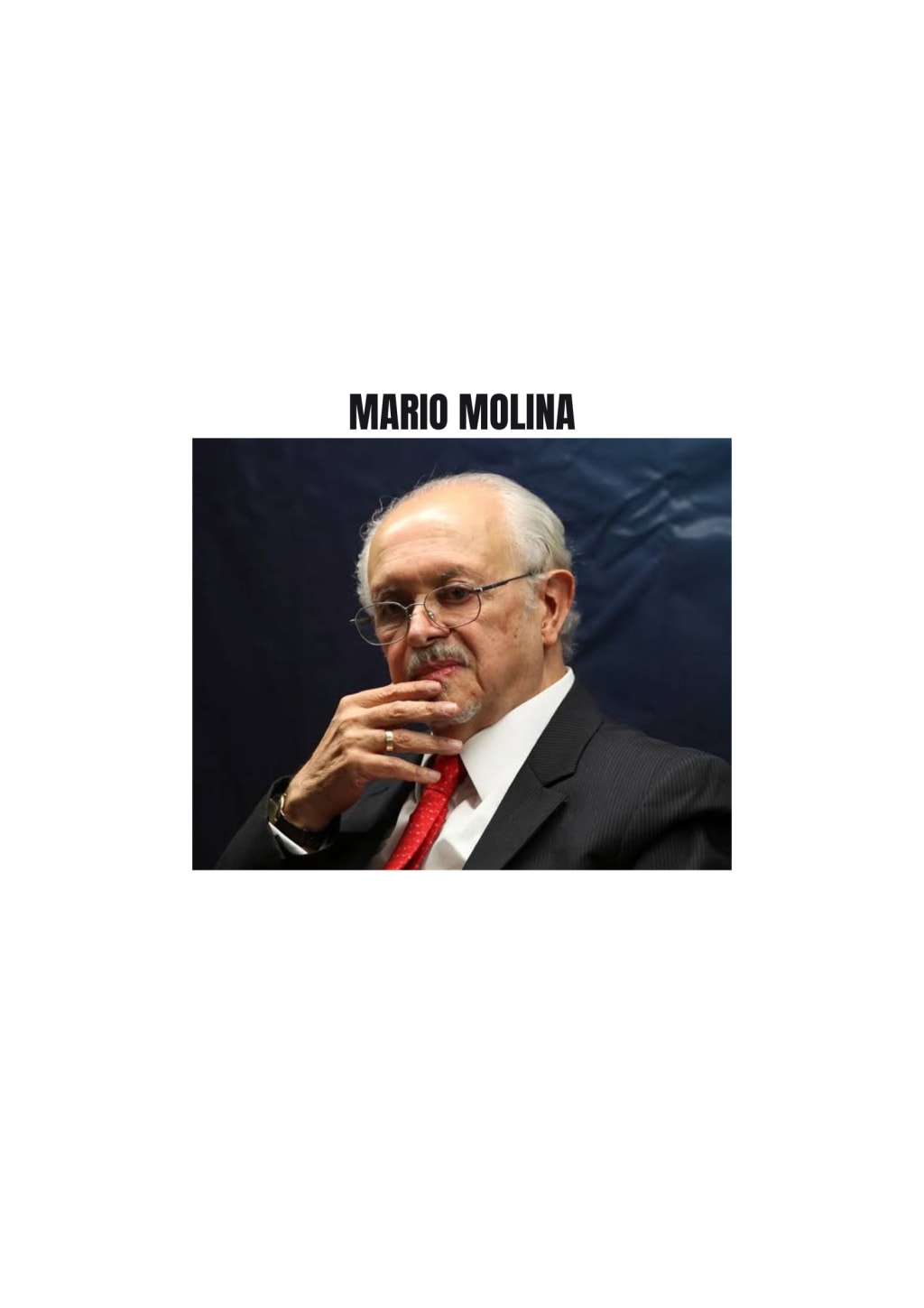MARIO MOLINA
"Remembering the Legacy of the Ozone Layer Pioneer and Climate Change Activist"

Mario Molina was a Mexican chemist who made significant contributions to our understanding of the depletion of the Earth's ozone layer. Born on March 19, 1943, in Mexico City, Molina was the son of a diplomat and a homemaker. He was interested in science from a young age and went on to earn a degree in chemical engineering from the National Autonomous University of Mexico in 1965.
Molina's research focused on atmospheric chemistry, specifically the interaction of human-made chemicals with the ozone layer in the Earth's atmosphere. In the 1970s, he and his research partner, F. Sherwood Rowland, discovered that chlorofluorocarbons (CFCs), which were commonly used in refrigerators and aerosol sprays, were responsible for the depletion of the ozone layer. This discovery earned Molina and Rowland the Nobel Prize in Chemistry in 1995.
The depletion of the ozone layer is a significant environmental issue that can have severe consequences for human health and the environment. The ozone layer in the Earth's atmosphere acts as a shield, protecting the planet from the harmful ultraviolet radiation emitted by the sun. When CFCs are released into the atmosphere, they break down and release chlorine atoms, which can destroy ozone molecules. This depletion of the ozone layer can lead to an increased risk of skin cancer, cataracts, and other health problems, as well as damage to crops and marine life.
Molina's research was instrumental in raising awareness of the dangers of CFCs and led to the Montreal Protocol, an international agreement signed in 1987 that aimed to phase out the production and use of CFCs. The Montreal Protocol has been successful in reducing the production of CFCs and other ozone-depleting substances, and the ozone layer is now showing signs of recovery.
In addition to his work on the ozone layer, Molina was also involved in researching air pollution and its effects on human health. He was a member of numerous scientific organizations, including the National Academy of Sciences and the Intergovernmental Panel on Climate Change. He was also a professor at the University of California, San Diego, where he mentored numerous students and young scientists.
Molina's contributions to science and his dedication to addressing environmental issues have earned him numerous awards and accolades throughout his career. In addition to the Nobel Prize, he was also awarded the Presidential Medal of Freedom by President Barack Obama in 2013. He was a vocal advocate for science and the environment, and he worked to raise public awareness of the importance of protecting the planet and preserving its natural resources.
His legacy lives on through his research, his advocacy, and his influence on the scientific community. He was a trailblazer in the field of atmospheric chemistry and an inspiration to future generations of scientists and environmentalists.
In conclusion, Mario Molina was a pioneering scientist whose research on the depletion of the ozone layer led to the discovery of the role that CFCs play in this process. His work was instrumental in raising awareness of the dangers of CFCs and led to the signing of the Montreal Protocol, an international agreement aimed at phasing out the production and use of ozone-depleting substances. Molina's legacy lives on through his research, his advocacy, and his influence on the scientific community, and he will be remembered as a trailblazer in the field of atmospheric chemistry and an inspiration to future generations of scientists and environmentalists.
-Mario Molina was a renowned Mexican scientist who dedicated his life to studying the Earth's atmosphere and its impact on climate change. He was a pioneer in ozone layer research and worked tirelessly to raise awareness about the negative effects of pollution on the planet.
Molina was born in Mexico City in 1943 and spent his early years studying chemistry at the National Autonomous University of Mexico. physical chemistry from the University of California, Berkeley, where he first became interested in atmospheric research. Molina's work on the chemistry of the stratosphere led him to discover the negative impact of chlorofluorocarbons (CFCs) on the ozone layer.
Molina's research, along with that of his colleagues, helped lead to the Montreal Protocol, an international agreement to phase out the production and consumption of ozone-depleting substances. This landmark agreement has been hailed as one of the most successful environmental treaties in history.
But Molina didn't stop there. He continued to work tirelessly to raise awareness about the negative effects of pollution on the planet, including the dangers of greenhouse gas emissions and climate change. He was a strong advocate for sustainable development and renewable energy, and worked with governments and organizations around the world to promote these goals.
Molina's legacy lives on through the work of the Mario Molina Center for Energy and Environment, an organization he founded in 2004 to promote sustainable development and environmental protection in Mexico and other countries. The center works on a variety of projects, from promoting energy efficiency to reducing greenhouse gas emissions and developing renewable energy sources.
In addition to his scientific work, Molina was also an inspiration to many young people, particularly those from underrepresented communities. He was a strong advocate for diversity and inclusion in science, and worked to promote opportunities for young people to pursue careers in STEM fields.
Sadly, Molina passed away in October 2020 at the age of 77. But his legacy lives on through his groundbreaking research, his tireless advocacy for the environment, and the work of the organizations he founded. Mario Molina was a true pioneer in the field of atmospheric science, and his contributions will be felt for generations to come.
In conclusion, Mario Molina was a remarkable scientist and environmental activist who devoted his life to studying and protecting the Earth's atmosphere. His research on the ozone layer and the negative impact of pollution on the planet helped to shape environmental policy around the world. His legacy continues through the organizations he founded and the many lives he touched, and his impact on the world will not be forgotten.
About the Creator
Chandan Lohar
Hello there! My name is chandan lohar , and I am a passionate writer who loves to create content that sparks conversations and inspires change. As a contributor to Vocal Media






Comments
There are no comments for this story
Be the first to respond and start the conversation.